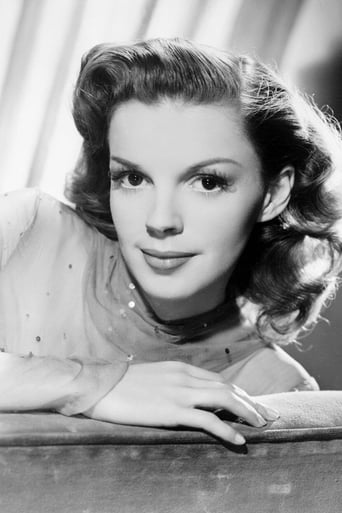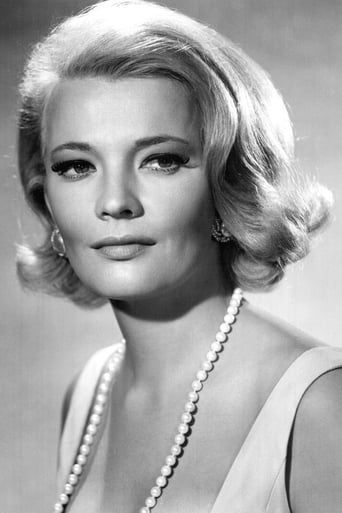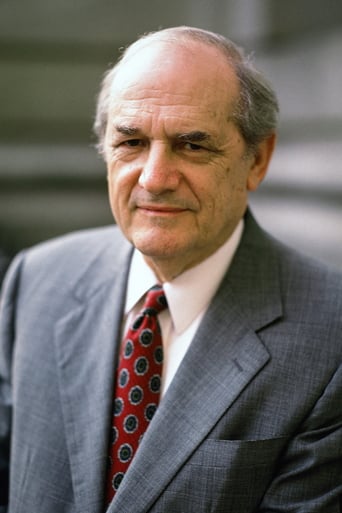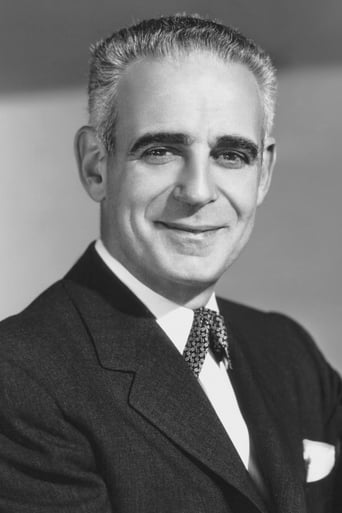Unlimitedia
Sick Product of a Sick System
Ceticultsot
Beautiful, moving film.
Spoonatects
Am i the only one who thinks........Average?
Jakoba
True to its essence, the characters remain on the same line and manage to entertain the viewer, each highlighting their own distinctive qualities or touches.
ElMaruecan82
"What does normal mean, anyway? He might be a bit on the slow side, but my boy Forrest is going to get the same opportunities as everyone else. He's not going to some special school to learn to how to re-tread tires." Now, who would have thought a movie was made that could enlighten us about the kind of destiny little Forrest escaped from thanks to his mother's iron-clad determination."A Child is Waiting" is set in a mental institution for troubled and emotionally disturbed children, and directed by John Cassavetes. It was his third movie following "Shadows" and "Too Late Blues", but didn't have the same impact and was inevitably overshadowed by his more revolutionary "Faces", "Husbands", you know, typical Cassavetes. The film might be a little too 'classic' and structured but the independent movies' pioneer has never been a structured storyteller anyway; his sense of structure was of emotions and instincts.And I guess I could see why, of all the directors, he was selected for such 'heavy' material. The documentary-like aspect of "A Child is Waiting" calls for an eye that already proved its acuteness to spot the vulnerability of the human soul without the use of cinematic tricks. The film renders with more or less efficiency the harrowing pain and discomfort the spectacle of mental handicap can inspire, with shades of optimism carried by these kids' smiles and attempts to learn. Made in 1963, it is as modern as if it dealt with today's kids. The opening credits show children's drawings and we can see they don't differ much from what kids born in the 2000's would draw.But all these efforts to hit a universally and timelessly sensitive chord can't distract from the fact that the film was a box-office failure.This is a movie whose making was unfortunately derailed by a growing antagonism between producer Stanley Kramer and Cassavetes. And by starring Burt Lancaster as the director of the institution, Dr. Clark, Judy Garland as Jean Hansen, the newly hired teacher and the screenplay being written by Abby Mann, the film is torn between the didacticism of "Judgment by Nuremberg" and the emotionality of "Faces". Cassavetes disowned it, Kramer wished they could have transcended that barrier of disagreement for the sake of that profound and haunting issue. As much as a Cassavetes' fan I consider myself, I appreciate the point made by Kramer. This is a film too important to be disregarded because of cinematic considerations.Cassavetes has a point though. There are some elements that are overly dramatized and seem to be just made in order to extract the "right" emotions from us, Clark's heroic stand-up against the patronizing compassion of doctors and politicians who consider these kids as abnormal, or Hansen' misty-eyed compassion toward little Reuben. The acting is obviously well-intentioned and I can see sincerity in the way Lancaster and Garland approach their roles. Yet the film is never as powerful as when it just lets the camera roll and shows the kids acting normally within their abnormality. I've seen child acting in old movies and this film contains one of the greatest ever. In a film like "The Night of the Hunter", children play a pivotal role but they fail to convince you, here, maybe the mental condition works because the kids are playful or disillusioned, thus naturally indifferent to the camera eye.To some extent, the film reminded me of the movie "Freaks" in the sense that the protagonists were playing their roles and never really tried to act, to the point that they were deemed as freaks from the perspective of society but never the eye of Todd Browning or the viewers. Cassavetes achieves the same thing, when the kids try to 'play the game', it's less from the awareness that there's a camera, but because most of these kids really want to please the adults and overcome their handicap. But they're still confronted to the severe judgment of adults, parents and society, that's their tragedy, they're dependent on people's perceptions, even positive ones. We all do but at least, we have the privilege of reciprocity. Cassavetes tried to free the kids from that burden but his personal vision was contradicted by Kramer's: that discipline was the only way to shield these kids. And the soul of this conflict is Reuben who refuses to get off the car in the opening sequence.I don't know if the kid was really troubled or not, but he is in a worse condition because unlike some kids, he "looks" normal, so as the doctor said, he might be more likely to face rejection. Reuben also grows a fondness on Mrs. Hansen which he sees like a second mother and she's caught in a situation where she's tempted to become a loving model but then decides to call his mother played by Gena Rowlands. Rowlands, Cassavetes' wife and muse elevates the film through her five-minute monologue about guilt poisoning a mother's heart when she decides to leave her child. The problem isn't about love, whatever it is, sooner or later, love is compromised and the kid is lost anyway. In a way, she proves Clark's point about the necessity of an institution, the lesser of two evils.Which takes me back to that shift between Kramer and Cassavetes, it is quite interesting, it's like the film reflected its own polarizing subject, I don't think I would agree that these kids could grow normal without the help of adults and a mental structure, but again, Cassavetes works through emotions, and with his sharp filmmaking, manages to elicit powerful performances from these children. The film is never as good as when it deals with emotional rather than trying to be too preachy for its own good. The point it tries to make is honorable, but the camera of Cassavetes handles the hardest part.
MartinHafer
"A Child Is Waiting" is a film showing the happenings at a state institution for developmentally delayed kids. Back in the bad old days, people were routinely sent to giant state schools to live out their lives. Not only the mentally retarded, but blind, mentally ill, deaf and various disabled adults and kids were routinely sent off to these places--and it was the rare case where they stayed home with their families. This warehousing of these 'defectives' was thought to be best and fortunately for most of these individuals, such mass institutionalization has become a thing of the past (though de-institutionalization offers its own set of problems as well). The school in this film isn't quite a warehouse (you do get to see one later in the film) but it's far from a homelike environment. So, when you watch this movie, understand that it was very typical for the early 1960s--but not today.Burt Lancaster plays a doctor who runs the institution in the film. In some ways, he's very likable and committed and in others he's a very hard individual. He hires a new teacher for the place--an inexperienced by well-meaning lady (Judy Garland). At first, things seem to go well but when the two disagree on how to handle a particularly troubled kid, sparks start to fly. This boy has been abandoned by his family and they never visit him--and Garland is determined to do something to get him to open up and become a happier and higher-functioning resident. She also wants to give her love to the boy. But for Lancaster, pity is not on his agenda--he wants to toughen up the kids--to force them to respond to his less cuddly ways.For me, the story about the one boy is not all that important. To me, what's important is the insight it gives in the treatment and education of developmentally delayed kids--and to show how it was done long ago. to psychology majors, those who work in the field or anyone who lives with and loves someone with developmental delays, it's well worth seeing. A very good film--and you might want to keep a box of Kleenex handy just in case.By the way, one of the kids in the institution was played by Billy Mumy--the same kid who later starred on "Lost in Space" and as an adult on "Babylon 5"--and played the scary kid with freaky powers on "The Twilight Zone". Barbara Pepper who played 'Doris Zipfel' on "Green Acres" plays one of the teachers. Also, Steven Hill plays the disturbed boy's neglectful and rather angry father. He played the original lead on "Mission:Impossible" as well as the original District Attorney on "Law & Order". Finally, this was one of Judy Garland's last films. In 1963, she made this as well as "I Could Go On Singing" before dying so tragically young.
jzappa
A Child Is Waiting. What a wonderful title. It alone emits the feelings the film does. There are moments when we feel as if the film is going to take off into a flight of elatedness in its music, but the nature of the film in Cassavetes's eyes, Cassavetes not having been given a great deal of trust during the film's production, joins like a backdrop and we are reminded of the right, and occasional necessity, film has to reality. He certainly drew beautiful work out of Judy Garland. I see so many real people in her performance.This, however, is not the film that Cassavetes initially made. Cassavetes wanted to make a film about the hidden, twisted beauty of a mentally handicapped child, that adults have less tolerance, patience, and basic wisdom that retarded children can have. Producer Stanley Kramer had other, more cautious, less daring thoughts. In his re-editing, he fashioned from Cassavetes's cut a film about the loneliness and pitiful existence of mentally handicapped people, and that the only place for them is in an institution. It would've been quite fascinating had Cassavetes been granted more trust by Kramer and screenwriter Abby Mann. Nevertheless, with this history behind this movie kept in mind, maybe one can find even more clarity in what is communicated. Perhaps both Cassavetes and Kramer had truth to their perspectives. Perhaps this is a very unique cinematic effect that has come from this very unorthodox film. If they'd been able to reach an agreement, their views could've combined and made a truly profound film.
elliewarner
I came in about half way through the movie, but was still deeply moved by it. Judy Garland has never been a favorite, but she was excellent in this. Burt Lancaster plays it quiet and cool and is also great. The boy's mother, Gena Rowlands I think, portrays the family tragedy in every look and expression. Movies from this era are often overplayed and melodramatic, but this one is realistic and heartbreaking. I would like to learn more about the making of the movie. A visit to a home for retarded adults had a documentary feel. I think it was a real location. A heart wrenching predicament for families is presented with truth, compassion and understanding. I hope caring places like the home/school for little Reuben, as depicted in the movie, exist. This movie is definitely worth seeing.







